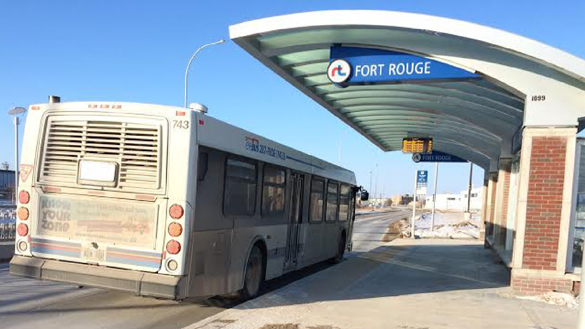A recent Winnipeg Free Press article on rapid transit funding reports Mayor Bowman as saying, “…council has yet to identify where its funds will come from,” and that the administration has suggested the funds could come from raising transit fares and/or property taxes.
Green Action Centre responded with a letter to the Mayor pointing to more sustainable and fair funding options than those proposed by city administrators. Options like re-prioritizing the hundreds of millions of dollars lined up for road extensions and road widening, which only serve to entrench car-dependence, and complete the rapid transit system first. And instead of making homeowners and transit users pay for transportation infrastructure, let’s adopt alternative funding from motor vehicle users, who otherwise get a free ride.
We followed the letter with a backgrounder which outlined how city and provincial commitments to sustainability entail sustainable and fair choices on both the expenditure and revenue sides of the budget. We noted the triple subsidy to motor vehicles, which:
1. pay less than half the cost of road infrastructure construction and maintenance;
2. pay nothing for the emissions dumped into the atmosphere that contribute to climate damage in Manitoba and around the world, and;
3. pay no sales tax in support of public benefits.
We urged council not to repeat the mistake of 2011 of assessing transit riders and not motor vehicle drivers, for increased revenues to balance the budget.
By Peter Miller
Green Action Centre Policy Committee Member




I am an advocate for Fare Free Transit, that is opposed to wasting public money on any further expansions of the rapid transit system beyond this first leg, which I agree must be completed now, despite the outrageous cost.
Rapid transit in Winnipeg is far too costly, and benefits far too few riders for that cost.
What Winnipeg really needs is more buses, longer hours of operation, and many more (heated) wait shelters.
All of this should/could be paid for by dedicated taxes from both provincial and city sources.
The province is committed to 50% of the transit systems cost, regardless of fares collected.
The city could dedicate a specific property tax for transit that would represent a major saving in everyone’s average household transportation budgets.
Even if the taxed homes continue to drive more than they ride, the reductions in travel time, especially during the rush hours, will benefit everyone.
In addition, Autopac public insurance could/should be tapped as a new revenue source for FFT.
Fare Free Transit would make all streets much safer, especially at the rush hours, where most of our accidents occur now, saving millions, so it would be reasonable to dedicate those saved millions towards FFT.
We agree with you totally on where the priorities should lie, Maureen. With 50% of Winnipeg’s GHG emissions and 40% of the Province’s GHG emissions coming from transportation and both levels of government committed in principle to sustainability and reduced emissions, that’s where their priorities should lie too.
Besides neither the City nor the Province have enough money to throw around to pay for car-centric infrastructure and keep cars and trucks on welfare. Both economics and climate threats point to the same conclusion.
Note that you and other citizens can bring this message home by registering to speak at the Infrastructure Renewal and Public Works or the Executive Policy Committee meetings on March 16 and 17. See http://www.winnipeg.ca/interhom/budget/2015budget/.
We’ll let you know if or when the Mayor replies.
Please let us know what response you get from the Mayor. There is still much work to be done to shift our culture away from the “car-centric” way. It leaves one with the impression that any other form of transportation (active or public) is an add-on or nice to have, rather than even an equal option, when I feel they should be the preferred options.
I agree with you Maureen.
Do you agree with me that our city would benefit more from a Fare Free Transit system that is funded from the tax base, or do you want us to continue with a user pay system?
I think that it is fair for transit users to pay a portion of the cost , but I would like to see it be a lesser share. For some years I have been advocating a system of compulsory bus passes for everyone who works within the city of Winnipeg but does not walk or cycle to work or works at home. Those who need their vehicle for work should also be exempt. For those who live outside the city limits, there should be park and ride opportunities at all of the major roads into the city. One person who lives outside the city and commutes in told me he would use the system and would appreciate it. There should also be park and ride opportunities in the city. The bus pass should come in two pieces,and one piece should be placed on the dash board in a designated park and ride lot in the city.
The bus pass should also be transferrable. if
I would like to see the price of a pass significantly reduced for everyone. I at first proposed $10 but with inflation that could go up to $20-$25. As you pointed out the province would match these funds. With access to more progressive and growth based taxes, this would be preferrable to raising taxes on homes and buildings.Mobility taxes would be better since drivers would get a benefit from less congested roads.